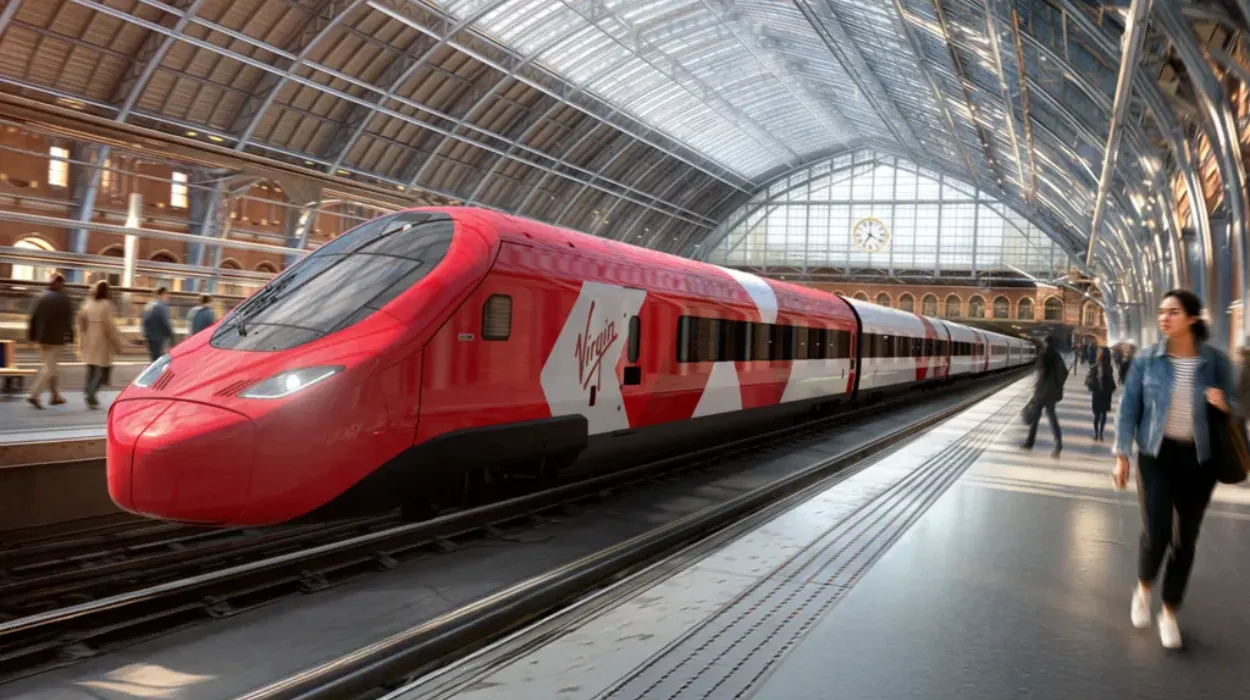Virgin (Parliament Politics Magazine) – Virgin Trains has been granted regulatory approval to challenge Eurostar’s 30-year monopoly on passenger services through the Channel Tunnel by gaining access to the critical Temple Mills maintenance depot in east London. Virgin plans to launch competing cross-Channel rail services by 2030, offering passengers more choice and potentially lower fares on routes to Paris, Brussels, Amsterdam, and beyond.
Virgin’s Landmark Regulatory Approval
As reported by The Independent UK national news and Neil Lancefield, Virgin Trains, led by Sir Richard Branson, has successfully cleared a major regulatory hurdle to operate on the Channel Tunnel route. The UK’s Office of Rail and Road (ORR) approved Virgin’s application to use the Temple Mills depot, a vital facility capable of maintaining European-sized trains and connected directly to the High Speed 1 track serving the tunnel.
Virgin Trains’ ability to access Temple Mills is key because it is the only train depot in the UK suitable for servicing the larger continental trains that run through the Channel Tunnel. Without this, Virgin could not realistically operate cross-Channel passenger services. The ORR’s decision effectively ends Eurostar’s exclusive control over the Channel Tunnel’s passenger rail services, which has been in place since its opening in 1994.
Virgin’s Plans to Introduce Competition
Sir Richard Branson expressed enthusiasm about the development as reported by both The Independent and The Telegraph. He stated,
“It’s time to end this 30-year monopoly. We’re going to shake-up the cross-Channel route for good and give consumers the choice they deserve.”
Virgin aims to start operations by 2030 with routes from London to mainland European cities including Paris, Brussels, Amsterdam, and potentially expanding to Germany and Switzerland.
Virgin Group’s spokesperson said,
“There are no more major hurdles to overcome, and Virgin is ready to take up the challenge, given its award-winning experience in the train industry and track record for building globally successful travel brands.”
The company is optimistic about delivering better services and competitive fares on cross-Channel journeys, which are currently dominated by Eurostar.
Eurostar’s Position and Industry Reaction
Eurostar, which has held a monopoly on passenger services through the Channel Tunnel since 1994, reacted with disappointment. The news comes just days after Eurostar announced a €2bn investment in new double-decker trains designed to increase capacity and improve passenger experience. However, Virgin’s entry signals a major shake-up in the market and could lead to lowered prices and improved services through increased competition.
Eurostar’s monopoly has long been criticised for limited competition and higher ticket prices, with fares often rising significantly as departure dates approach. The introduction of Virgin as a new operator could pressure Eurostar to enhance its offerings and pricing strategies.
Important Role of the Temple Mills Depot
The Office of Rail and Road, through Martin Jones, deputy director of Access and International, highlighted the significance of the Temple Mills depot in this development. Jones remarked, “This decision supports customer options and fosters international travel growth, unlocking millions in private sector investment.” He added that although further collaboration and safety approvals remain necessary, the regulator is ready to work closely with Virgin as their plans advance.
The ORR’s assessment concluded that the depot can accommodate either an expanded Eurostar fleet or a competitor like Virgin, but not both simultaneously. The approval of Virgin’s proposal means that other applicants for cross-Channel services, including the Spanish newcomer Evolyn, Gemini Trains partnered with Uber, and Trenitalia, were denied access to Temple Mills.
Virgin’s History and Return to Rail Sector
Virgin Group previously dominated UK rail with Virgin Trains operating on the West Coast Main Line from 1997 until 2019. This new expansion into the Channel Tunnel route marks a high-profile return to the UK and European rail sector for Sir Richard Branson and his company. Virgin’s experience with award-winning rail services both domestically and internationally is cited as a key factor ensuring their readiness to compete effectively against Eurostar.
Outlook and Next Steps
Virgin must still navigate additional regulatory approvals related to track access and safety before launching services in 2030. The development is expected to enhance passenger choice, increase cross-Channel rail capacity, and potentially reduce fares through competition, benefiting travellers between the UK and continental Europe.
Martin Jones concluded by emphasising the broader impact of competition:
“This will unlock substantial private sector funding and support growth in international rail travel from London St Pancras, which plans to nearly double passenger capacity to 5,000 per hour in the coming decade”.


